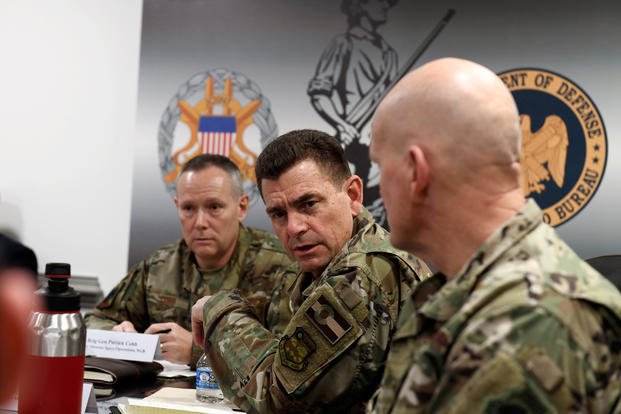You can't have a U.S. Space Force without the Space Guard. That's the message Guard leaders have for lawmakers and officials at the Pentagon still framing the organization of the newest military branch.
Adjutants General from California, Alaska, Hawaii, Florida and Colorado on Wednesday made a case that their guardsmen, who already do extensive work on offensive and defensive space missions, will someday need to report to the Space Force.
"Personally, I don't see how we have a Space Force without a Space Guard," said Maj. Gen. Michael Loh, the adjutant general for the Colorado National Guard. Loh said the individuals create a "force multiplier" of expertise, not only because of their military service but also because many use relevant skills in their day jobs. The officials told reporters at the Pentagon that aligning U.S Space Force with a Space guard element will also help the service become more independent.
Related: Pentagon Adds Personnel, Ups Nuke Investments as Space Force Takes Shape
"If we don't bring the guard over, then I don't know if they're really truly independent. Because then we have to go ask, 'Mother, May I?' to somebody else," added Brig. Gen. Patrick Cobb, deputy director of space operations at the National Guard Bureau headquarters. Cobb explained that additional steps would be required if the Space Force needed to call up guardsmen attached to other services.
The leaders' worries were prompted by a first report sent to Congress Feb. 3, which didn't outline plans for units that help protect the homeland.
Top Air Force and Space Force officials must brief lawmakers every 60 days, until at least March 31, 2023, on the status of the new branch's implementation, according to the fiscal 2020 National Defense Authorization Act signed into law in December. The plans prevent the military's new sixth branch from making new hires early on, in order to limit redundancy and bureaucratic bloat.
The Pentagon has said it is still figuring out how exactly it will transfer specific space-oriented troops to the service. Of the Space Force's ultimate goal of 16,000 personnel, it plans to transfer at least 6,000 people in by year's end, most of them from the Air Force.
But some Guard leaders want answers sooner.
Loh said he was "concerned" because the latest plans delivered to lawmakers did not specify what happens to the roughly 1,500 Air Force and Army guardsmen who already serve in space-focused jobs.
"When that report went across to Congress, I got called by my units going, 'What does this mean for me?'" Loh said. Other space guard units reside in Ohio, Arkansas, New York and Guam, he said.
The next Space Force report is due next month; leaders are using the interim time to lobby lawmakers, advocating for a cohesive strategy for these nine states.
"As the adjutants general, we are individually approaching our congressional delegations," said Maj. Gen. David Baldwin, adjutant general of California. "And we are strongly advocating for a space National Guard and it's being received very well by the members on [Capitol] Hill."
Maj. Gen. James Eifert, the adjutant general for Florida's guard, said the goal isn't to create more red tape or increase costs.
"We're not looking to stand up 54 Space National Guards," Eifert said. "The concern it would be creating this huge, bureaucratic overhead is really not what we envision as how it would be and operate."
Cobb, the space operations deputy director, compared space to cyberwarfare, noting that officials 10 years ago were questioning whether the Guard should be involved in cyber activities.
"There were some folks who are trying to not allow us to get into cyber," Cobb said. "Fast-forward to now, we've been doing support for elections -- governors and state election officials have asked for it."
Maj. Gen. Ken Hara, Hawaii's adjutant general, said he just wants the space mission to thrive.
In December, Hawaii created its first-ever Air National Guard Space Control Squadron permanently assigned to the Indo-Pacifc Command region, Hara said.
The unit, which will reach initial operating capability at Pacific Missile Range Facility on Kauai in roughly two years, will be in charge of "offensive and defensive counterspace and space situational awareness," including electronic warfare, officials told Breaking Defense.
"We would like to move forward with it and recognize that the National Guard is the right place to have this [capability]," Eiffert said.
-- Oriana Pawlyk can be reached at oriana.pawlyk@military.com. Follow her on Twitter at @Oriana0214.
Read More: The Marine Corps is Moving All of Its Raiders to the East Coast













